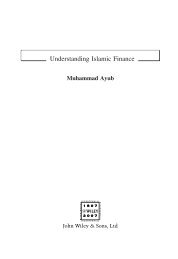Leadership and Management Development in Education (Education ...
Leadership and Management Development in Education (Education ...
Leadership and Management Development in Education (Education ...
Create successful ePaper yourself
Turn your PDF publications into a flip-book with our unique Google optimized e-Paper software.
THE NATIONAL COLLEGE FOR SCHOOL LEADERSHIP83• Only modest dem<strong>and</strong>s are made of programme participants.• Its emphasis on practice is at the expense of theory <strong>and</strong> research.• Its reliance on practitioners to lead programmes limits <strong>in</strong>novation.• Its dom<strong>in</strong>ance of school leadership development is unhealthy.• It is unduly <strong>in</strong>fluenced by the government.Its dem<strong>and</strong>s are too modestInstead of the susta<strong>in</strong>ed engagement with research <strong>and</strong> literature, expected <strong>in</strong>the best university courses, the College’s expectations of participants aremodest. Even the NPQH, the m<strong>and</strong>atory qualification for pr<strong>in</strong>cipalship, can beachieved by tak<strong>in</strong>g a 48-hours residential programme followed by a skillsassessment, although this is set to change <strong>in</strong> 2008. The decision to requireheadteachers to acquire a specialist leadership qualification has been widelyapplauded but there are criticisms of the scope <strong>and</strong> nature of the NPQH. It isunambitious <strong>in</strong> that it requires limited engagement with theory <strong>and</strong> research<strong>and</strong> is focused primarily on applicants’ perceived ability to do the job. It isevident that it is below the <strong>in</strong>tellectual level regarded as necessary <strong>in</strong> NorthAmerica (Bush 2004). The new model NPQH seems likely to provide a widerrange of learn<strong>in</strong>g opportunities for ‘tra<strong>in</strong>ee heads’ but the nature of thecontent rema<strong>in</strong>s unclear. Other college offer<strong>in</strong>gs are not formally assessed sothere is no straightforward way to judge the effectiveness of leadershiplearn<strong>in</strong>g despite the external evaluation programme (Bush et al. 2007b).Brundrett et al.’s (2006: 101) comment about the basic nature of NCSLprovision requires serious attention:Questions rema<strong>in</strong> as to how far the governmentally <strong>in</strong>spired leadershipprogrammes have moved beyond the more reductivist elements of thecompetence paradigm towards educational programmes that develop thek<strong>in</strong>d of reflective know<strong>in</strong>g <strong>and</strong> higher order cognitive abilities that willundoubtedly be required by leaders <strong>in</strong> the complex world of educationalleadership <strong>in</strong> the 21st century.The emphasis on practice is at the expense of theory <strong>and</strong> researchLev<strong>in</strong>e (2005: 56) notes that the NCSL ‘acts as a bridge between scholarship<strong>and</strong> practice, believ<strong>in</strong>g that research should drive practice <strong>and</strong> practice shouldfuel research’. However, the ma<strong>in</strong> emphasis is on participants’ experience <strong>and</strong>NCSL programmes have been criticised for neglect<strong>in</strong>g theory <strong>and</strong> research.University courses, <strong>in</strong> contrast, cont<strong>in</strong>ue to be targeted at leaders at all levels
















